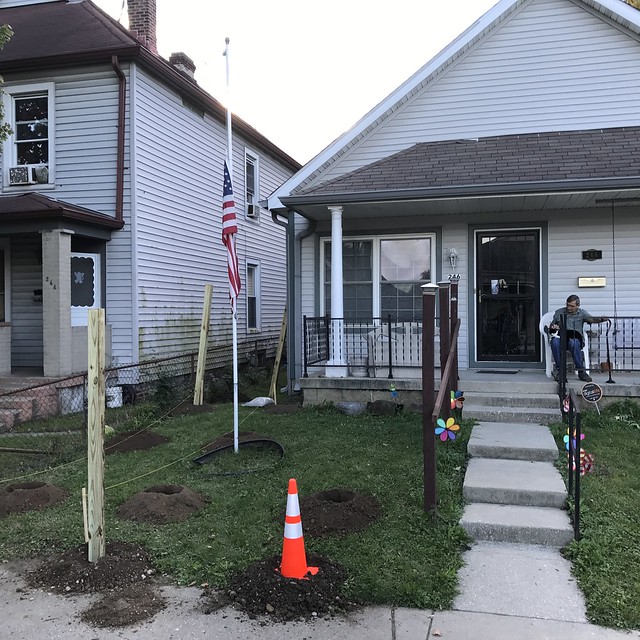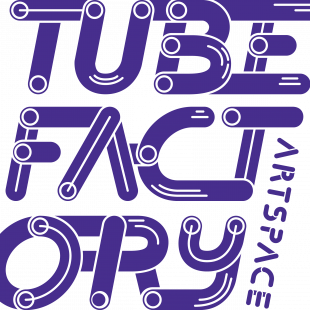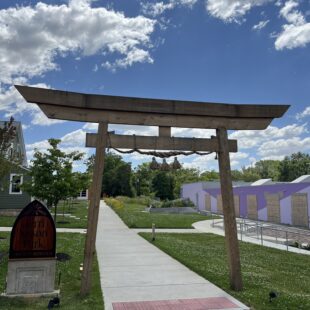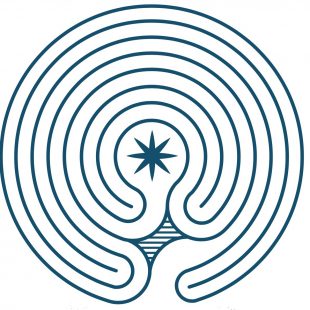In 2016, thanks to the support of the Indianapolis Neighborhood Housing Partnership (INHP), we completed a community and artist home-repair pilot program designed to test the idea of artists and neighbors teaming up to meet home-repair needs in Indianapolis neighborhoods where we work. This idea came from conversations in the community about how some neighbors were facing costly code violations and safety issues related to repairs to their homes that they could not fix themselves or afford to hire others to fix.
Throughout 2016, our team worked to build and further furnish the Bottom Level Toolshop at Tube Factory artspace. The grant helped make the shop safe for public use for classes and training. We also created a training curriculum and approach for basic safety classes and for classes specific to common exterior home repair issues. This program was part of Big Car’s broader goal to develop and launch a pilot program using the shop at Tube Factory and our portable tools to train artists and craftspeople to support homeowners unable to make home repairs themselves in neighborhoods we serve.
Throughout the pilot process for artist-led home repair, we connected with homeowners primarily in the Near West and Garfield Park areas. We worked with artists and neighbors from Garfield Park, Near West or River West, and Riverside neighborhoods. We reached them through promoted open calls and interest meetings that took place at Tube Factory. We also worked with neighborhood organizers and artists we know in each community to build awareness of this opportunity.
The Artist home repair pilot project allowed us to offer basic safety classes noted above – free of charge – to artists and neighborhoods who would volunteer to work on the repairs. This project presented an opportunity for artists and other residents from the neighborhood, with little or no previous experience, to learn how to use tools and collaborate with the community. Artists and neighbors were able to help renovate and repair their own houses as well as neglected and vacant houses, and support neighbors with homes in need of repairs — all without spending limited resources for classes. Artists and neighbors then received free trainings in a three-part class set up. Class one included a five-hour shop and tool safety classes along with an introduction to step building. The second class was a two-hour class on building ramps. And the third class was an all-day on sight building effort as a team that included instruction and installation of projects.
In an effort to connect with additional folks, like skateboarders, interested in building, we offered classes focused on ramps, steps, and rails. These key elements to home repair can prevent code violation fees and offer accessibility to older or less able residents, as well as items skateboarders use for their activities. The response to this idea was strong by skaters, though we had trouble matching up schedules. This is an approach we will try again in the future.
Through channels from the City and neighborhood levels, we found neighbors facing code-enforcement issues and those in the most need of house repair. Three houses in Near West received repair work. One of the three houses had a large ramp installed. This particular resident struggles to walk and may soon need a wheel chair for mobility. The ramp will accommodate this resident’s needs. Another house had a railing installed in the front of the house and a broken railing replaced in the back of the house. The third house had two railings installed along the front steps.
We are now exploring how this program will work in its next steps in 2018.
Check out photos and video clips here or below.




